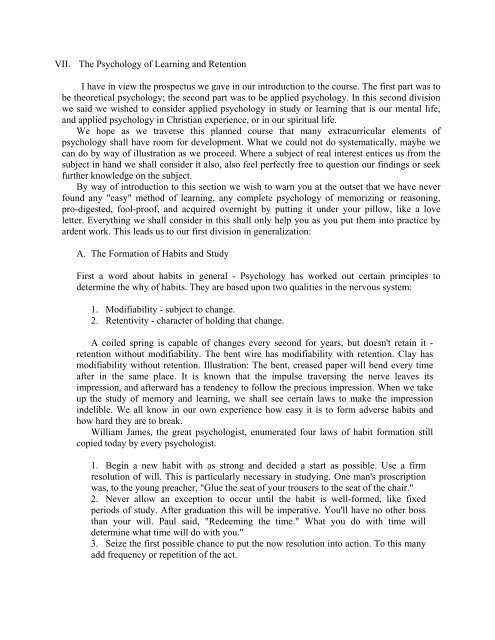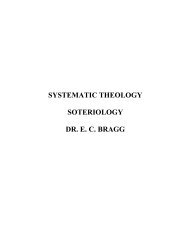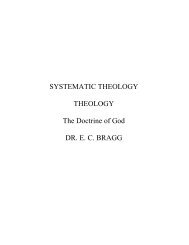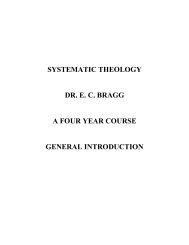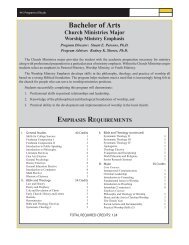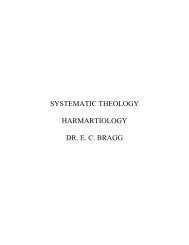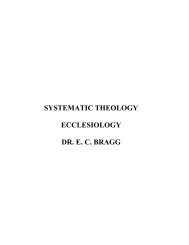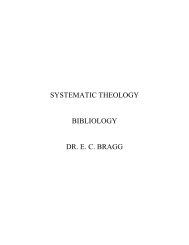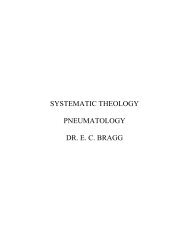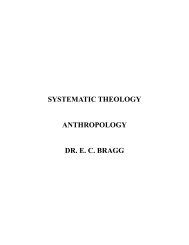CHRISTIAN PSYCHOLOGY DR. E. C. BRAGG - Trinity College
CHRISTIAN PSYCHOLOGY DR. E. C. BRAGG - Trinity College
CHRISTIAN PSYCHOLOGY DR. E. C. BRAGG - Trinity College
Create successful ePaper yourself
Turn your PDF publications into a flip-book with our unique Google optimized e-Paper software.
VII. The Psychology of Learning and Retention<br />
I have in view the prospectus we gave in our introduction to the course. The first part was to<br />
be theoretical psychology; the second part was to be applied psychology. In this second division<br />
we said we wished to consider applied psychology in study or learning that is our mental life,<br />
and applied psychology in Christian experience, or in our spiritual life.<br />
We hope as we traverse this planned course that many extracurricular elements of<br />
psychology shall have room for development. What we could not do systematically, maybe we<br />
can do by way of illustration as we proceed. Where a subject of real interest entices us from the<br />
subject in hand we shall consider it also, also feel perfectly free to question our findings or seek<br />
further knowledge on the subject.<br />
By way of introduction to this section we wish to warn you at the outset that we have never<br />
found any "easy" method of learning, any complete psychology of memorizing or reasoning,<br />
pro-digested, fool-proof, and acquired overnight by putting it under your pillow, like a love<br />
letter. Everything we shall consider in this shall only help you as you put them into practice by<br />
ardent work. This leads us to our first division in generalization:<br />
A. The Formation of Habits and Study<br />
First a word about habits in general - Psychology has worked out certain principles to<br />
determine the why of habits. They are based upon two qualities in the nervous system:<br />
1. Modifiability - subject to change.<br />
2. Retentivity - character of holding that change.<br />
A coiled spring is capable of changes every second for years, but doesn't retain it -<br />
retention without modifiability. The bent wire has modifiability with retention. Clay has<br />
modifiability without retention. Illustration: The bent, creased paper will bend every time<br />
after in the same place. It is known that the impulse traversing the nerve leaves its<br />
impression, and afterward has a tendency to follow the precious impression. When we take<br />
up the study of memory and learning, we shall see certain laws to make the impression<br />
indelible. We all know in our own experience how easy it is to form adverse habits and<br />
how hard they are to break.<br />
William James, the great psychologist, enumerated four laws of habit formation still<br />
copied today by every psychologist.<br />
1. Begin a new habit with as strong and decided a start as possible. Use a firm<br />
resolution of will. This is particularly necessary in studying. One man's proscription<br />
was, to the young preacher, "Glue the seat of your trousers to the seat of the chair."<br />
2. Never allow an exception to occur until the habit is well-formed, like fixed<br />
periods of study. After graduation this will be imperative. You'll have no other boss<br />
than your will. Paul said, "Redeeming the time." What you do with time will<br />
determine what time will do with you."<br />
3. Seize the first possible chance to put the now resolution into action. To this many<br />
add frequency or repetition of the act.


